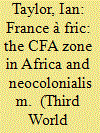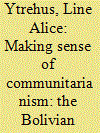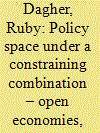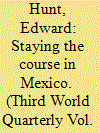|
|
|
Sort Order |
|
|
|
Items / Page
|
|
|
|
|
|
|
| Srl | Item |
| 1 |
ID:
166693


|
|
|
|
|
| Summary/Abstract |
Over 50 years after 1960’s ‘Year of Africa’, most of Francophone Africa continues to be embedded in a set of associations that fit very well with Kwame Nkrumah’s description of neocolonialism, where postcolonial states are de jure independent but in reality constrained through their economic systems so that policy is directed from outside. This article scrutinises the functioning of the Communauté Financière Africaine (CFA), considering the role the currency has in persistent underdevelopment in most of Francophone Africa. In doing so, the article identifies the CFA as the most blatant example of functioning neocolonialism in Africa today and a critical device that promotes dependency in large parts of the continent. Mainstream analyses of the technical aspects of the CFA have generally focused on the exchange rate and other related matters. However, while important, the real importance of the CFA franc should not be seen as purely economic, but also political.
|
|
|
|
|
|
|
|
|
|
|
|
|
|
|
|
| 2 |
ID:
166691


|
|
|
|
|
| Summary/Abstract |
Recent years have seen increased scholarly attention given to the issue of child soldiering. Primarily dedicated to the decision-making calculus of rebel groups, this body of work has generally emphasised supply-side versus demand-side arguments. We contribute to this growing literature by explicitly investigating a previously untested aspect of the latter. Prior scholarship has made vague references to a potential association between economic endowments and child soldiering, including natural resource wealth, but scant empirical attention has been given. We argue that the specific type of endowment has important consequences for the decision to utilise child soldiers. We argue access to and exploitation of lootable natural resources (e.g. gemstones) to be especially likely to promote the use of child soldiers due to their ease of access, the low skills required to harness them and the heightened likelihood that groups will become more profit-oriented. A systematic cross-national investigation of rebel groups provides robust evidence that lootable resources such as diamonds and gemstones are strongly associated with the use of children, while non-lootable resources such as oil are not.
|
|
|
|
|
|
|
|
|
|
|
|
|
|
|
|
| 3 |
ID:
166698


|
|
|
|
|
| Summary/Abstract |
This paper looks at the question of development by focusing on both Cuba and the Democratic People’s Republic of Korea. At the heart of the project is the notion of sustainability, and how to achieve well-being even in the most challenging conditions, isolated economies and sanction-laden realities. This is done by tracing both countries’ engagement and development in the fields of health and education. We suggest that political engagement with these countries should be prioritised, without challenging an established political order but with its consent, and with the hope that future generations are socialised to a culture of openness.
|
|
|
|
|
|
|
|
|
|
|
|
|
|
|
|
| 4 |
ID:
166697


|
|
|
|
|
| Summary/Abstract |
The Kurdish population in Iran feels disenfranchised and excluded from the political system. Based on an original survey of Iranian Kurds, it is revealed that Kurds lack trust and confidence in the central government and do not exhibit any emotional connection with Iranian identity or the Islamic Republic of Iran. Overwhelmingly, survey respondents put their Kurdish identity and affiliations as the primary point of reference. This emotional and political disconnect with Iran poses a serious challenge to the incumbent regime. It is an affront to the official rhetoric of ethnic unity and Iranian solidarity that is reinforced by Islamic principles under the Islamic Republic of Iran. This has led the incumbent regime to opt for a security response to a clearly political challenge. However, as the survey data in this research reveals, the securitisation of Iran’s response to its Kurdish population is only widening the gap, and aggravating the situation. The securitised approach to Kurdish aspirations for inclusion and acceptance is a counterproductive strategy with significant risks for the Islamic Republic of Iran.
|
|
|
|
|
|
|
|
|
|
|
|
|
|
|
|
| 5 |
ID:
166694


|
|
|
|
|
| Summary/Abstract |
In Bolivia, the state and society is undergoing radical transformations. The indigenous movements have revitalised traditions such as communitarianism, and ‘communitarian development’ has come to the forefront of Bolivian politics. The aim of this article is to identify what communitarian development means in the Bolivian context; how it is conceived and how it is practiced. I examine how communitarian development is conceptualised in the Aymara indigenous movement and in policy documents, and analyse what communitarianism might mean to people who uphold such values. I identify and discuss five different but intertwined significations; communitarian economy, communitarian work, communitarian management, communitarian law and communitarian values. I show that Bolivian communitarianism contains conceptualisations of cultural phenomena, which emerge at the nexus of experiences and expectations for the future, and argue that, despite tensions and pitfalls, communitarian development has the potential to increase indigenous wellbeing and agency and to contribute to a more nuanced understanding of what communitarianism is, or could be.
|
|
|
|
|
|
|
|
|
|
|
|
|
|
|
|
| 6 |
ID:
166695


|
|
|
|
|
| Summary/Abstract |
This paper’s main aim is to contribute to the debate on the impact of China’s rise on the established norms and practices in the field of international development. To do so, it zooms in on a single infrastructure project, the Jakarta-Bandung high-speed rail line, which involved intense competition between China and Japan. Specifically, it examines how competition between China, a non-Western emerging power, and Japan, an OECD member, led to a recalibration of both China and Japan’s approaches to infrastructure financing in the region. The findings suggest that rather than straight convergence or competition between diverging models, there is an ongoing process of two-way adjustment between China, and representatives of the dominant global norms and practices. We also argue that to understand the implications of China’s participation in the field of international development, and its impact on the ‘rules of the game’ of global governance, researchers should avoid positioning inquiries within the premises of China’s one-directional impact on the development assistance regime. Rather, it is necessary to take into account a complex set of relationships including China, host countries and other ‘socialised’ actors, and the process of negotiation between them.
|
|
|
|
|
|
|
|
|
|
|
|
|
|
|
|
| 7 |
ID:
166692


|
|
|
|
|
| Summary/Abstract |
Small island developing states (SIDS) face significant economic, social and environmental challenges. Current mainstream approaches to SIDS recognise these limitations and thus promote increased economic integration into the international economy to provide the governments with resources and power to counter the effects of these challenges. Yet these remedies have so far led to high levels of deficits and high levels of indebtedness, as well as high levels of vulnerability and dependence on key sectors that offer very income- and economically sensitive products and services. In addition, and in assessing the experience of Caribbean SIDS, these remedies have led to diminishing government policy space. This has in turn contributed to the lack of real innovation in the way Caribbean SIDS interact with the volatile international market. While much has been written about the economic impact of open markets and the inherent weaknesses within SIDS, the analysis herein allows for the development of a more comprehensive assessment of the implications for the SIDS’ policy space as well as their ability to regain it and develop innovative approaches that avoid uniquely reactionary measures to the current international economy and its gyrations.
|
|
|
|
|
|
|
|
|
|
|
|
|
|
|
|
| 8 |
ID:
166699


|
|
|
|
|
| Summary/Abstract |
With drug-related violence reaching record levels in Mexico, there has been growing debate over its causes. US and Mexican officials blame many factors, including problems with their strategy in the drug war, fighting among cartels, corruption in police forces, an ineffective legal justice system and US drug demand. In this paper, I argue that the Mérida Initiative, a multi-billion dollar programme of US assistance, is an important additional factor. Drug-related violence increased in the years after the implementation of the Mérida Initiative, declined when Mexican officials paused new programmes in 2012 and increased again as US and Mexican officials implemented new Mérida programmes in the following years. Over the same time period, drug-related homicides and complementary counternarcotics assistance from the US Department of Defense are positively correlated. Using US records, I show that US officials have been willing to overlook the growing violence because they have been more focused on achieving their economic and strategic objectives. I conclude that their actions have played a significant role in increasing drug-related violence while starting an ominous new phase of US imperialism in Mexico.
|
|
|
|
|
|
|
|
|
|
|
|
|
|
|
|
| 9 |
ID:
166696


|
|
|
|
|
| Summary/Abstract |
This paper examines methodological avenues for a historical sociology of development through a close reading of Naomi Hossain’s recent book, The Aid Lab: Understanding Bangladesh’s Unexpected Success (2017). Hossain’s conjunctural perspective, the formative moment of Bangladesh in environmental catastrophe, war and famine in the 1970s, establishes a novel account of the country’s development trajectory. Contingencies of the moment and consequent political uncertainties committed an emergent national elite to a largely informal but substantive social compact against future crises of subsistence. The result was a specific, transnational power configuration rendering Bangladesh a test case for developmental interventions and the production of knowledge regarding them. Debates in critical development studies have often posited that such ‘elite commitment’ is a consequence and not so much a precondition for social improvement, brought about through struggles from ‘below.’ How might these positions be reconciled by shifting the temporal frames of reference? By rendering historical processes legible as conflicting and complementary interactions between different social forces and actors? How can such actors be envisaged without presuming their identities and interests as fixed or given, but rather, as shaping and being shaped by such processes? These questions motivate the immanent critique and reappraisal of Hossain’s timely work, highlighting its significance for dynamic analyses of historical capitalism today through the ‘universal particularities’ of the national case.
|
|
|
|
|
|
|
|
|
|
|
|
|
|
|
|
|
|
|
|
|